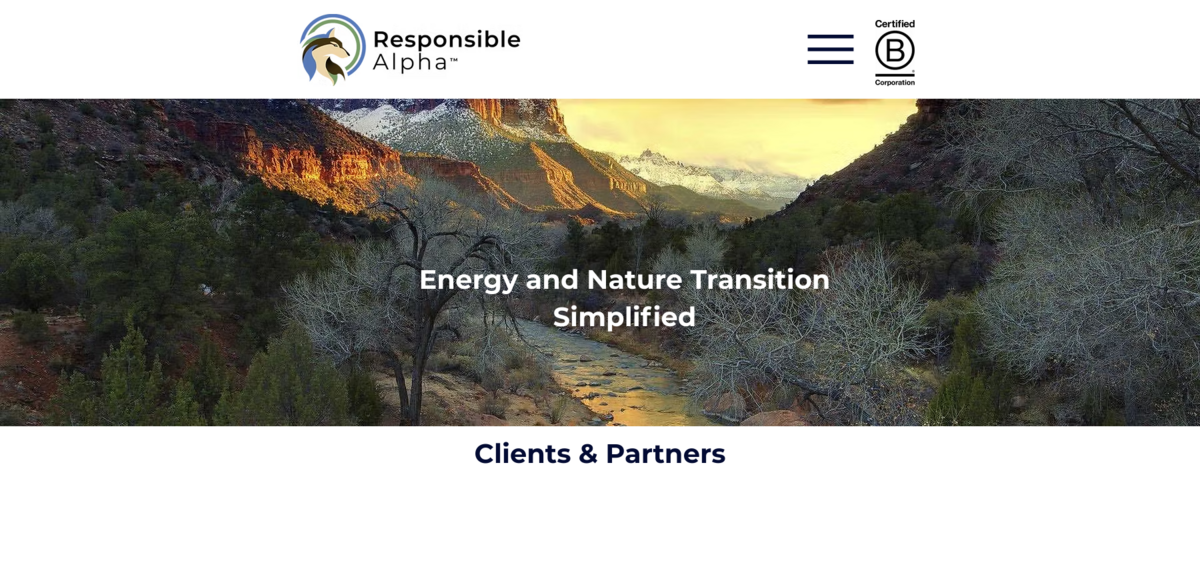What is Responsible Alpha?
Responsible Alpha partners with organizations across the board to guide their transition toward a net positive economy by 2050. This isn’t just any consultancy—it’s a certified minority-owned, B Corp certified, Delaware-registered Public Benefit Corporation. What’s more, it’s proudly owned by its staff, advisors, and board members, making it a truly purpose-driven enterprise. Their focus? Helping businesses navigate the complex world of sustainable finance and green investments with a clear, actionable roadmap.
Main Benefits of Responsible Alpha’s Approach
Here’s what sets Responsible Alpha apart, with some key figures and facts that highlight their impact:
- Certified minority-owned and B Corp certified, ensuring strong ethical and social governance.
- Offers a three-pronged solution framework: Assess, Build, Cultivate.
- Assessment services include Market Research & Intelligence, Climate Risk Modeling, and Nature Finance.
- Building capabilities in Energy Transition, Green Finance & Bonds, and Investment Advisory.
- Cultivating skills through Capacity Building and Corporate Reporting.
- Boasts a B Corp score of 115.1, reflecting high standards in sustainability and impact.
- Focuses on key sectors like green finance, sustainable finance, ESG, and consultancy within financial services.
Insights on the Paris Agreement and Climate Progress
Ten years after the Paris Agreement, it remains the backbone of global climate cooperation. It’s lowered projected warming by nearly 1°C and reshaped policy, finance, and technology landscapes. But here’s the catch—the current commitments and implementation? They’re just not enough. The 1.5°C goal is slipping away unless action dramatically accelerates this decade. Responsible Alpha keeps a close eye on these developments, helping clients understand the urgency and scale of change needed.
Energy Market Dynamics: Oil and LNG Trends
Oil supply is growing, but demand? That’s a different story. Demand growth is slowing, especially in OECD countries and transportation sectors, while emerging economies and petrochemicals keep it ticking. This mismatch creates a volatile market, full of risks for investors and policymakers alike. Meanwhile, LNG, once hailed as the flexible bridge fuel, now faces potential oversupply. Reports from LSEG warn that if many pre-FID projects go ahead, liquefaction capacity could grow at an 8.1% compound annual rate through 2035—way faster than demand is expected to rise.
Renewables and Regional Climate Impacts
For the first time ever, renewables have overtaken coal as the world’s largest electricity source. This marks a huge milestone in the global energy transition. Clean energy is scaling fast enough to meet new demand and help curb emissions. But not all regions are equal in this shift. Europe, for example, is warming faster than any other continent, with climate-related damages projected to hit €45 billion annually between 2020 and 2023. These regional disparities highlight the urgent need for tailored strategies in sustainability and finance.
Project Impact: Linking to Sustainable Development Goals (SDGs)
- SDG 7: Affordable and Clean Energy – by promoting renewable energy and green finance.
- SDG 9: Industry, Innovation, and Infrastructure – through investment advisory and capacity building.
- SDG 12: Responsible Consumption and Production – via sustainable finance and corporate reporting.
- SDG 13: Climate Action – supporting climate risk modeling and energy transition efforts.
- SDG 15: Life on Land – integrating nature finance into market intelligence.
Looking Ahead: The Future of Sustainable Finance
Responsible Alpha is at the forefront of a rapidly evolving landscape. As global LNG capacity is projected to grow by 60% by 2030—with the U.S. contributing half of that—there’s a real risk of oversupply that could shake markets. The Corpus Christi LNG terminal, operated by Cheniere Energy, is a key player here, rapidly expanding U.S. export capacity. Meanwhile, crude exports from Corpus Christi are flowing to EV hotspots like the U.S., South Korea, and Europe, where electric vehicle growth is shrinking future oil demand. It’s a paradox that underscores the complexity of the energy transition. Responsible Alpha’s insights and solutions help businesses stay ahead of these shifts, balancing opportunity with risk in the journey toward sustainability.






















